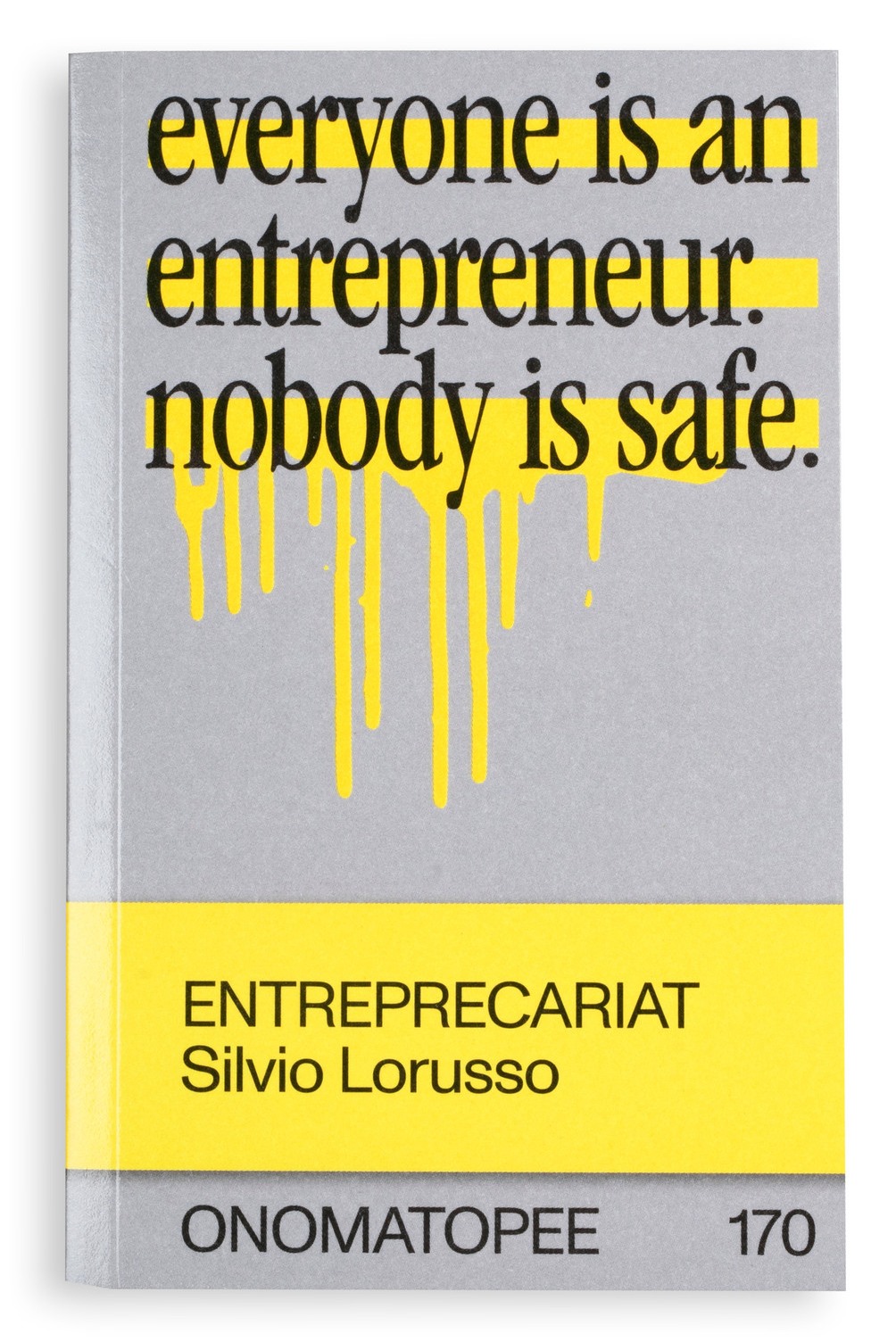Silvio Lorusso: Entreprecariat: Everyone Is an Entrepreneur Nobody Is Safe (2018–) [IT, EN]
Filed under book | Tags: · capitalism, design, entrepreneurship, labour, platform, precariat, precarity, work

“Entrepreneur or precarious worker? These are the terms of a cognitive dissonance that turns everyone’s life into a shaky project in perennial start-up phase. Silvio Lorusso guides us through the entreprecariat, a world where change is natural and healthy, whatever it may bring. A world populated by motivational posters, productivity tools, mobile offices and self-help techniques. A world in which a mix of entrepreneurial ideology and widespread precarity is what regulates professional social media, online marketplaces for self-employment and crowdfunding platforms for personal needs. The result? A life in permanent beta, with sometimes tragic implications.”
Italian edition
With a foreword by Geert Lovink and an afterword by Raffaele Alberto Ventura
Publisher Krisis Publishing, Brescia, 2018
ISBN 9788894402902, 8894402908
223 pages
English edition
Translated by Isobel Butters
Publisher Onomatopee, Eindhoven, 2019
Creative Commons BY-NC 4.0 License
ISBN 9789493148161, 9493148165
257 pages
Interviews with author: Walter Marocchi (2019), Floor van Luijk (Metropolis M, 2020).
Reviews: Marco Petroni (Artribune, 2019), Tiziano Bonini (cheFare, 2019), Sandro Moiso (Carmilla, 2019), Giulio Gonella (Volume, 2020), Alessandro Ludovico (Neural, 2020).
Commentary: Nicola Bozzi (Digimag, 2017, EN).
Author
Publisher (IT)
Publisher (EN)
WorldCat (IT)
WorldCat (EN)
Entreprecariat – Siamo tutti imprenditori. Nessuno è al sicuro (Italian, 2018, 9 MB)
Entreprecariat: Everyone Is an Entrepreneur Nobody Is Safe (English, trans. Isobel Butters, 2019, 7 MB, added on 2020-5-12)
McKenzie Wark: Capital Is Dead: Is This Something Worse? (2019)
Filed under book | Tags: · capitalism, data, information, labour, marxism, nature, neoliberalism, production, theory

“It’s not capitalism, it’s not neoliberalism—what if it’s something worse?
In this radical and visionary new book, McKenzie Wark argues that information has empowered a new kind of ruling class. Through the ownership and control of information, this emergent class dominates not only labour but capital as traditionally understood as well. And it’s not just tech companies like Amazon and Google. Even Walmart and Nike can now dominate the entire production chain through the ownership of not much more than brands, patents, copyrights, and logistical systems.
While techno-utopian apologists still celebrate these innovations as an improvement on capitalism, for workers—and the planet—it’s worse. The new ruling class uses the powers of information to route around any obstacle labor and social movements put up. So how do we find a way out? Capital Is Dead offers not only the theoretical tools to analyze this new world, but ways to change it. Drawing on the writings of a surprising range of classic and contemporary theorists, Wark offers an illuminating overview of the contemporary condition and the emerging class forces that control—and contest—it.”
Publisher Verso, London, 2019
ISBN 9781788735308, 1788735307
202 pages
Book launch (with Natasha Lennard, video, 90 min).
Interviews with author: Verso Books (video, 2019, 16 min), Red May TV (with Alexander Zevin, Jasper Bernes and Wendy Liu, video, 2020, 110 min), Guy Mannes-Abbot (Tank, 2019).
Reviews: Garrett Pierman (Marx & Philosophy, 2020), Ben Tripp (Hyperallergic, 2020), Madeleine Collier (Afterimage, 2020), Colin Drumm (Cosmonaut, 2019), Mark Steven (Sydney Review of Books, 2020), Steve Hanson (Manchester Review of Books, 2020), Antonio Navarro (Teknokultura, 2020, ES).
HTML
PDF (9 MB, added on 2019-11-22)
Notes sur les mouvements (2013-2014) [French/English]
Filed under artist publishing, magazine | Tags: · body, choreography, dance, education, labour, movement, performance

A free publication edited by Romana Schmalisch during her residency at Les Laboratoires d’Aubervilliers.
“The first issue analyses the conjunction of dance with Labour Movements of the 1930s (New Dance Group) as well as its use in the industry to enhance efficiency (Laban/Lawrence); it looks at the vague image that we have from various professions, researches the value of the performance of a work and its equivalence in the wage, and considers different forms of abstractions (notations and graphics) and training methods.”
“The second issue focuses on the question of education. In an interview, sociologist Anne Querrien discusses social norms and the school system. In her text, the London-based writer Marina Vishmidt revisits an earlier essay which considered the relationship between contemporary dance and the de-materialization of labour. What changes about this relationship as all employment becomes more and more of a brutal hypothesis in our post-crisis conditions?”
“The last, third, issue deals with what is at stake when one learns a job, with relationships between teachers and students, with various methods of education, and with the way these systems reflect certain social norms.”
Edited by Romana Schmalisch
Publisher Les Laboratoires d’Aubervilliers, Aubervilliers, 2013-2014
Open access
24 pages per issue
Issue 1 (September 2013)
Issue 2 (March 2014)
Issue 3 (September 2014)

